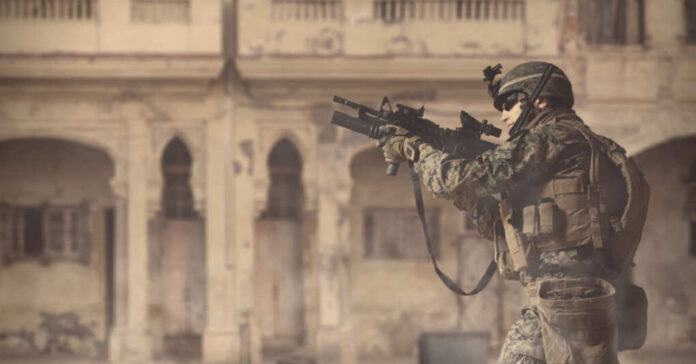Early in the morning on December 8th, American troops at the US Embassy in Baghdad were awoken by the once familiar sound of the “incoming” alarm. Rockets fired from Iranian-backed militias were setting them off and have doing so more consistently since the start of the Palestine and Israeli conflict.
Despite a lull in attacks from November 24th to December 1st during a ceasefire between Israel and Hamas, troops in both Iraq and Syria have been on enhanced notice since the first attacks occurred. While that timeframe was rather quiet, a poorly executed dual rocket attack at the US embassy in Baghdad failed to materialize in any significant damage.
Unsurprisingly, no group was willing to claim responsibility for such a poorly executed mission. Meanwhile, the mid-October attacks were gleefully claimed by an umbrella organization that represents multiple Iranian-backed groups. The same organization has financial and logistical connections with Hamas.
Calling themselves “Islamic Resistance of Iraq,” they had threatened to target US troops for President Biden’s public and swift support of Israel following Hamas’ attacks on October 7th that left at least 1,200 Israelis dead.
With the swift call from US troops, Iraqis responded in full force. Iraqi Prime Minister Mohammed Shia al-Sudani called the attackers “unruly, lawless groups that do not in any way represent the will of the Iraqi people,” according to Reuters. As far as al-Sudani was concerned, they were committing acts of terror and putting the safety and security of the nation at risk.
As of December 7th, Iranian-backed militias had left US troops in Iraq and Syria alone for 24 hours before their sudden early AM attack on the 8th, according to Pentagon officials.
In October, Ahmad “Abu Hussein” al-Hamidawi, head of the Kata’ib Hezbollah militia, made it very clear that US troops are currently at risk. “Our missiles, drones, and special forces are ready to direct qualitative strikes at the American enemy in its bases and disrupt its interests if it intervenes in this battle.” Their desire to keep American interests out of this battle does not fall on deaf ears and only emboldens the warfighters who are well within the ranks of the US military.
What “Abu” forgets is that the American military has been kept on a chain for over a decade now. The skull-cracking, finger-breaking, and door-kicking Soldiers and Marines from the 2003-2009 era of troops are still in uniform. These salty and combat-hardened leaders may have been forced to take cushier positions since combat operations ended. Just make no mistake about it; they still know how to kick ass.
Many have been yearning to get back to that kind of fight. The return of shooting first and asking questions later went with the plans for major assaults and firefights that legends are made in. A simple opportunity to help some poor dumb bastard to die for his cause is all they ask for. Now that Abu wants to present it to them, do you think anyone is going to complain about it?
They might get that wish, too.
PM al-Sudani might have little choice but to ask the Americans to increase their presence on Iraqi installations. While technically still there simply in an advise and assist capacity, drone operators have been busy providing surveillance and response to rocket and mortar attacks. A jump boots first back into a combat role would require a significant commitment of troops, as well as a boost in our capabilities.
Given the reduction in force the military underwent due to COVID vaccine mandates, as well as the virus itself, it starts looking like it would be an incredible uphill battle trying to do it. To ensure we maintain readiness at US installations, we would need a tremendous force and ample reserves on standby. Needless to say, it’s not what we’re ready for, but damn if we won’t be successful if need be.



















